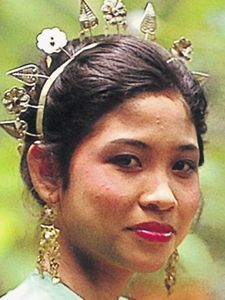 The Bugis (sometimes called the Ugi) live in the province of South Sulawesi. The Bugis region is called Tellumponcoe and it consists of the regencies of Bone, Soppeng and Wajo.
The Bugis (sometimes called the Ugi) live in the province of South Sulawesi. The Bugis region is called Tellumponcoe and it consists of the regencies of Bone, Soppeng and Wajo.
The Bugis are a dynamic, highly mobile people. They are considered to be the dominant people group in South Sulawesi. Many Bugis have left their home area to seek success and wealth and have moved to Sumbawa, Java, Papua and even Malaysia. Their Ugi language has six dialects.
The Bugis language is part of a larger language group called Bugis which also includes the Campalagian and two Dayak people groups on Kalimantan.
What are their lives like?
Most Bugis make their living by hunting, fishing, farming, raising livestock, or making handicrafts. Typically the Bugis who live in the mountains make their livelihood as farmers. Those living along the coastal regions usually work as fishermen.
The Bugis traditional dress is called a Wajo Ponco, which is believed to have originated from Malaysia. This type of dress is used only for traditional ceremonies and dances. The Bugis believe very strongly that certain days are special, with good fortune for events and activities held on the first Wednesday and last Thursday of each month. They consider Saturday to be a bad day, more likely to bring misfortune.
In Bugis society, there are several social classes based on one’s ancestors. These different levels include descendants of a king, nobles, district administrators, and various kinds of slaves. Two of the most important cultural values for the Bugis are called siri (personal honor) and siri-pesse (communal honor). A Bugis person must defend, maintain and build his own siri. The effort to obtain and maintain siri varies according to the context. For example, in an economic context, siri means working hard and being faithful. If one’s siri is offended, serious forms of revenge will be considered. Islam reinforced the traditional Bugis concept of siri in such a way that the typical Bugis person sees siri as the key to his or her self-identity as a Bugis Muslim.
The Bugis line of descent is bilateral (traced through both parents). After marriage, the newlyweds may choose to live near either the husband’s or the wife’s family, although initially, they live near the wife’s family.
What are their beliefs?
The Bugis are well known for their fervent adherence to Sunni Islam. However, many of them are still bound to their traditional system of animistic beliefs. Traditional culture has a significant impact on the Bugis due to its religious values.
What are their needs?
At present, the Bugis need financial investment and modernization in the public shipping and fishing industry. There is great potential in these sectors. South Sulawesi’s potential in the mining and industrial sectors is also largely untapped due to a lack of expertise and investment.
Leave a Reply